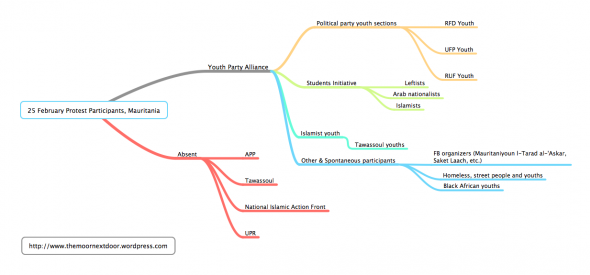Protesters took to the streets in Mauritania on Friday calling for political reforms and an end to President Mohamed Ould Abdel Aziz rule. Young people continued a sit-in the following day. @abbassbraham reports that protesters will be back to the streets tomorrow.
The Moor Next Door reflects on the protests by sharing a map of the political parties and social groups that took part and the notable ones that did not participate in the 25 February protests.
(RFD refers to Rally of Forces for Democracy; UFP the Union of Forces for Progress; RUF to the Rally for Unity and Democracy; UPR to the Union for the Republic (President Ould Abdel Aziz’s party); and APP to the People’s Progressive Alliance (Messaoud Boulkheir’s party. “FB organizers” refers to Facebook groups (of which there are many) and their followers who turned out to the demonstrations the largest of which have some thousands of members (two of these are mentioned by name).)
1. Background. Mauritania shares several problems in common with those Arab states experiencing demonstrations and uprisings namely a crisis of political legitimacy (its president came to power first through a coup and then by disputed elections), rising food prices and precarious living standards and a popular sense of disenfranchisement. Discontent with the President predates both Friday’s protests and the wave of unrest spreading across the region. Many Mauritanians are weary of government so frequently dominated by military men and their pliant apparatchiks. Ould Abdel Aziz is widely seen as having usurped the country’s nascent democratic process in 2008 (even if many saw the previous president as ineffectual and weak). Economic pressures, floods, near famine-like conditions and a risky water situation add to popular irritation, especially among youth. Protests are not uncommon in Mauritania, which has a lively and diverse opposition. The tone and content of this week’s protests differ from past protests in that they have been led by youth of various persuasions rather than political party leaders.
Amar responds to The Moor Next Door:
This posting seems good. It reflects in a condensed manner, the mauritanian political landscape with more or less accuracy.
However, nowhere, in the post, mention is made of close relations between the AZIZ’s regime (junta members, relatives and businessmen etc …) and France (françafrique team) and what, in reality, underlies these ties?
Perhaps, the response is this well organized Mauritanian wealth outflow to France (oil, gold, uranium, rare earths of Taoudeni basin) as well as various lucrative contracts with a strong smell of ”franceafrique”.
Moreover, it would have been interesting to attempt to correlate the genesis of French colonialism in Mauritania at the dawn of the 20th century versus the new form of “modern” colonialism adopted nowadays in order to achieve the same purposes, as before, but with less damage, today.
Tidinit argues that the main political parties in Mauritania will not abandon President Mohamed Ould Abdel Aziz:
As I have said before, unless Aziz does an inthinkable mistake such as shooting people, France, the US and the main political parties will not abandon him and will even support him for the next elections in 2014 because most benefit from Aziz’s patronage and money and that what they are looking for. Moreover, he has been in power for less than two years (he fooled the opposition, proof that they are a bunch of useless people) and I do blieve it is better he continues until next election and lose if he does bad or win if he does bad. People are kind of tired of change of power through coups since 1978.
Jackie Cohen says that Mauritania’s protests show the wave of revolutions in the region may begin to slow down:
Regardless, the more peaceful nature and smaller number of participants in Mauritania’s demonstration compared to neighboring countries in northern Africa might signal that the wave of revolutions in the region might begin to slow down. That would seem like a good thing, given how violent things have gotten in nations like Libya. And the more peacefully these changes come about, the better not only for the citizens involved but also for Facebook, which has gotten flack from people who exaggerate the site’s role in the Middle East.
#Mauritania tweets:
@abbassbraham:
Mauritania youth are back to the streets tomorrow. Bad night for the military junta and their hanger-ons.
@abbassbraham Any link to that? Trying to keep on top of #Mauritania for an English speaking Facebook page, no luck – any pg to follow?
Tell us, where is #Mauritania on the map http://ow.ly/1bxljY
11 millions as a gift by qatar to #mauritania will surely transfered to #aziz [President Mohammed Aziz] acount and his friends !
Will people take to the streets tomorrow? Let's wait and see.








1 comment
Since independence,one after another mauritanian presidents just sold de country and take the money. That’s why everone of them are so interested on “fire” the previous and sit in the presidential chair.
But mauritanian people must be carefull about what the asked. If they want freedom, human rights and justice for them, people from Senegal or mali, or any other african countries who are working in Mauritania deserves the same. Slivery is still a fact in Mauritania.